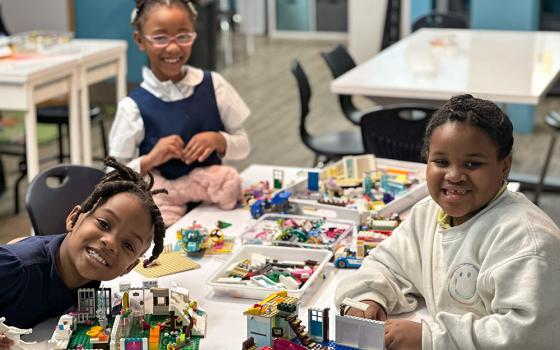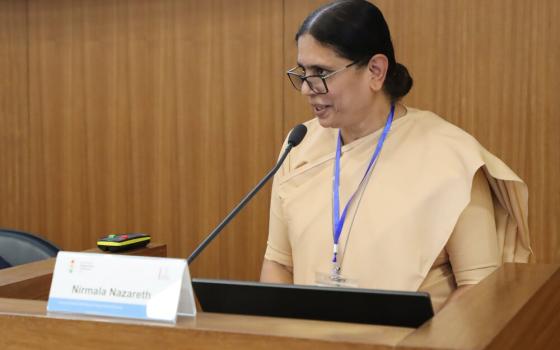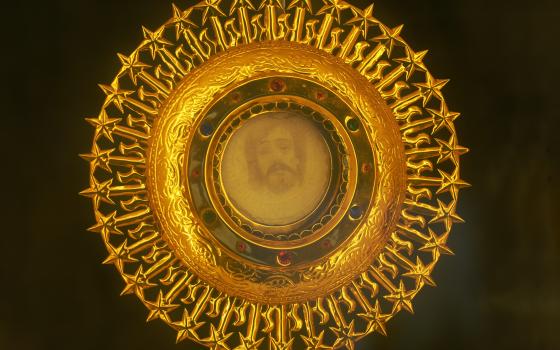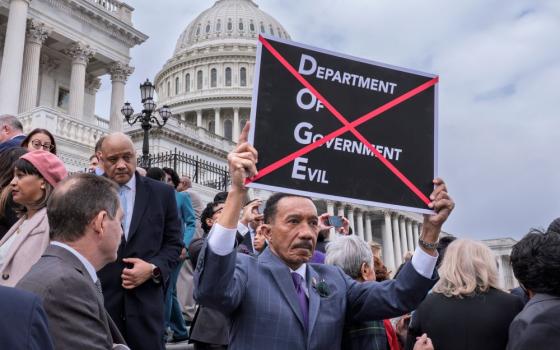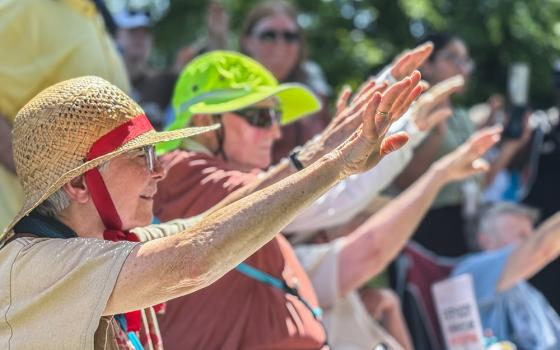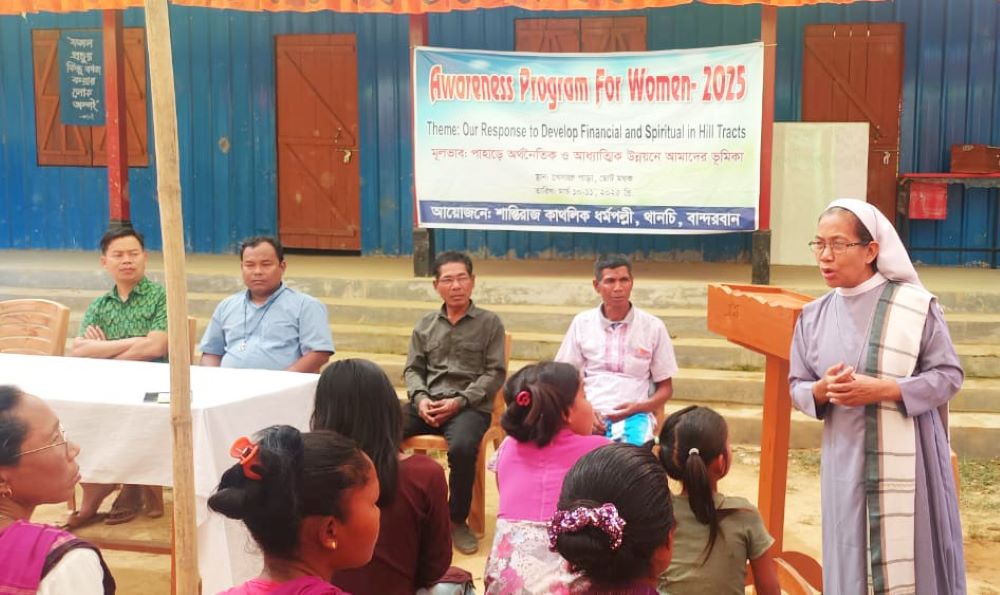
Sr. Zita Rema visited Indigenous women in the hilly district of Bandarban, Bangladesh, during an awareness-building seminar. (Courtesy of Zita Rema)
Sr. Zita Rema of the Salesian Missionaries of Mary Immaculate began working in Dhaka, the capital of Bangladesh, on the rights of migrant workers and providing them with pastoral care in 2006.
Rema was born in 1959, the second of three siblings in a Garo tribal family in the Bhalukapara Parish in the Diocese of Mymensingh. She began her career as a teacher and later worked in health care. She saw patients, especially pregnant women, and was moved to become a sister by observing their suffering. She joined the Salesian community in 1986, made her first vows in 1990 in South Bengaluru, India, and professed final vows in 1997.
Rema has worked with the Catholic Bishops' Conference of Bangladesh's Youth Commission, the Pontifical Mission Societies and the Pope's Worldwide Prayer Network. She recently spoke with Global Sisters Report about her ministry, the problems migrants face and possible solutions.
GSR: You work on promoting the rights of migrants. Why did you choose this ministry?
Rema: I have worked at the national office of the Catholic Bishops' Conference of Bangladesh's youth commission since 2006. At that time, I saw that those who came to work in Dhaka, especially those who worked as domestic workers, were suffering. They were tortured by their owners, physically abused, not paid properly and not given any leave. The same happened to the girls who worked in beauty parlors.
When we heard these things, we talked to the owners to solve the problem, and if necessary, we took legal action. I brought people with me and provided them with shelter in Dhaka. From that moment, I worked for all migrant workers.
How is the situation for migrant workers in the port city of Chittagong?
Although I had some experience, it was difficult. Most migrants work as laborers in parlors, garment factories, ship breaking factories and other factories. They are not paid properly if they suffer an accident at work. If they are sick, there is no treatment. Dismissals without notice are more common in Chittagong.
The biggest problem is that if someone dies, there is no money to send their body back to their village, and the company doesn't pay for it. When someone dies, we have difficulty raising money to send the body to their village. My congregation provides some money, and I ask people for donations, and that's how it works. If we could form a large fund, that would work better.
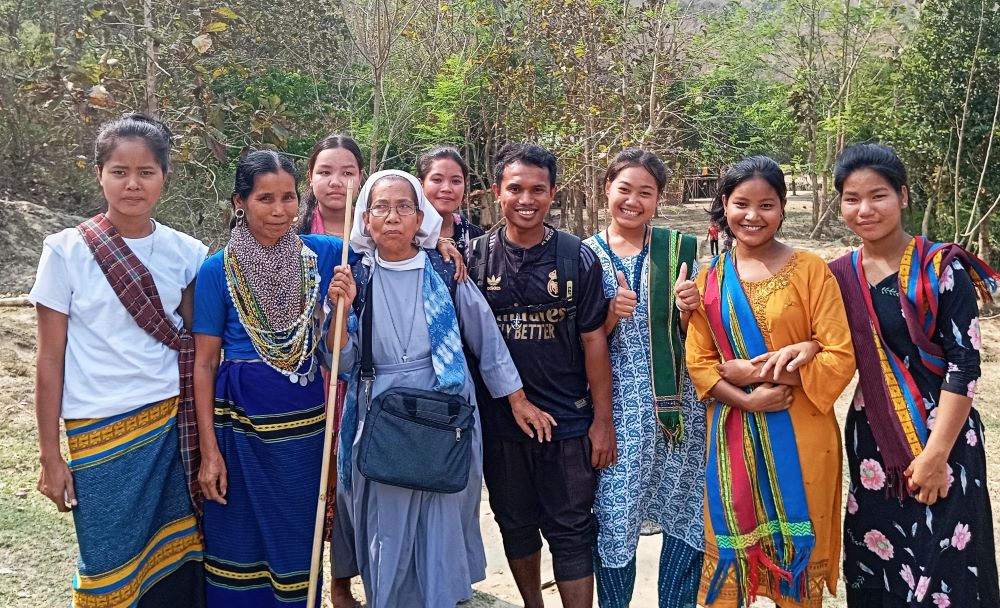
As a part of an awareness-building program against human trafficking, Sr. Zita Rema visited young people in an Indigenous village in Bangladesh. (Courtesy of Zita Rema)
How do you deal with these problems?
We go to every parlor where our migrant workers are and listen to them. We meet those who work in the garment factories and listen to their suffering.
If they have any problems, I speak to their employer. I often raise these problems with representatives of the International Labour Organization. They solve the problem, and sometimes I go to the police and help solve it. For those who need treatment, we take them to the hospital, especially the government hospital. A few doctors provide free treatment for these workers, and we put them in touch with them.
What is your biggest obstacle?
We are not given access to factories, so we don't know the hidden problems of the workers there. Workers often don't tell us all their problems because they are afraid of losing their jobs. Money is a big problem. They work for low wages and can't even support their family properly with their salary, and if they get sick, they don't have money to buy medicine.
What else is being done to help migrant workers?
There is a shelter for migrants in Dhaka where anyone can take [refuge] for a few days. We also set up a new small shelter in Chittagong, but they have to pay for accommodation and food. It would be better if this were free of charge for people in need. It is very important to provide this type of accommodation in big cities where migrants are. This initiative should be taken by the Catholic Bishops' Conference.
How do you provide pastoral care to migrants?
This is a big job. I find out where they live, go there and talk to them. I pray with them. When a new child is born, I prepare the parents and godparents for baptism. I also prepare those who will confess or receive the Eucharist by teaching them [the appropriate] prayers. For those who work and cannot attend weekly Mass, I take a priest to their area and the Mass is offered there. This way, the workers of other religions can also hear the word of Christ.
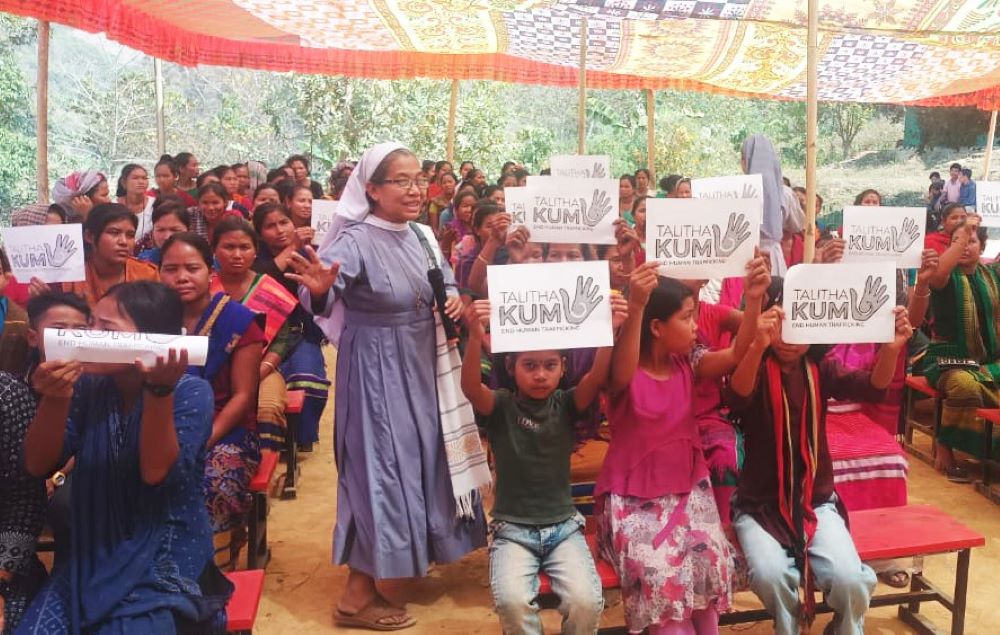
Sr. Zita Rema organizes an awareness-building program for migrant workers in the Archdiocese of Chittagong, Bangladesh. (Courtesy of Zita Rema)
You have been working with migrant workers for almost 20 years. What do you consider your greatest achievements?
It is impossible to work alone with the entire migrant community. However, there have been positive changes. There has been a huge increase in awareness among workers. People were trafficked in the name of jobs, but now, through our awareness programs, they won't go to work without being sure where they are being taken.
In many cases, they call me, and I assure them of the safety of their workplace. I also organize seminars at least once a month in areas where migrants live in Chittagong, where I listen to their problems and raise awareness.
What can the Catholic Church do to help migrants?
More extensive work needs to be done. Churches should set up migrant desks in every diocese where migrants are working, like in Chittagong and Dhaka. This will give people hope or courage that someone is working for them. Not only Salesians but also sisters, fathers and brothers from other congregations need to come forward and serve these migrant workers. It is essential to listen to and serve migrant workers.
Advertisement

